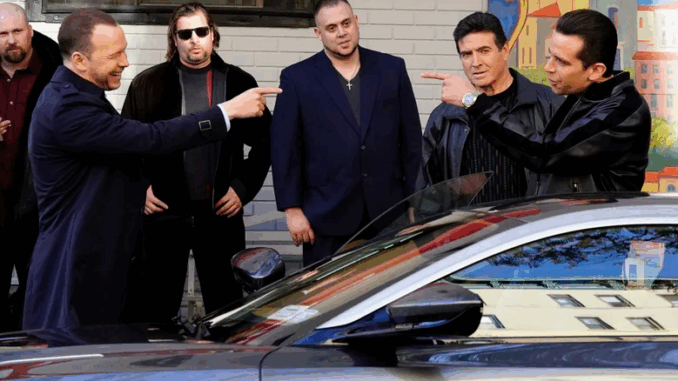
For over a decade, Blue Bloods has been a Friday night staple for millions of viewers, a ratings powerhouse built on the foundation of a beloved ensemble cast and the iconic family dinner. So, when CBS announced that the show’s upcoming 14th season would be its last, fans were left reeling. How could a show with such a loyal following and consistent viewership be taken off the air? The answer, it turns out, is not about ratings at all. A new theory has emerged, and once you understand it, the decision to cancel Blue Bloods while still leaving the door open for a rumored spinoff makes perfect sense.
The true reason for the cancellation, according to this theory, is not a failure of the show itself but a calculated business strategy. CBS is not ending the Blue Bloods legacy; they are preparing to reinvent it. By canceling the long-running, expensive ensemble show, they are clearing the way for a more cost-effective and creatively focused spinoff centered on a single, popular character: Danny Reagan.
The Business Case for Cancellation
On the surface, canceling Blue Bloods seems like a baffling decision. The show has been a consistent performer for the network for years, a reliable anchor in a volatile television landscape. But behind the scenes, the show was becoming a major financial liability.
The primary reason for the cancellation is the rising cost of production. A show that has been on the air for over a decade has a number of financial burdens that a new show does not. The salaries of its core, high-profile cast members—Tom Selleck, Donnie Wahlberg, Bridget Moynahan, and Will Estes—have risen over the years, making the show incredibly expensive to produce. The cost of a large ensemble cast, combined with the elaborate production value of shooting on location in New York, made Blue Bloods a show with a very high price tag.
In a modern television market dominated by streaming services and a demand for a high volume of content, a network like CBS is constantly looking for ways to maximize its profits. By ending a long-running, expensive show, they are freeing up a significant amount of capital that can be used to invest in new projects. The cancellation was not a sign of failure; it was a sign of a network making a smart, if unpopular, business decision to cut its losses and pivot to a new strategy.
The Real Reason: A Spinoff Strategy
The real reason for the cancellation is not just about cutting costs; it’s about re-allocating resources to a more profitable model. By ending the main series, CBS is paving the way for a rumored spinoff that would be significantly cheaper to produce. A show centered on Danny Reagan (Donnie Wahlberg), a fan-favorite character, would allow the network to capitalize on the existing Blue Bloods fanbase without the financial burden of the full ensemble.
The financial benefits of this move are clear. A spinoff would be a new production, which means it would not carry the expensive legacy contracts of the main show’s cast. It could be produced on a new budget, with a smaller core cast and a more focused storyline. The network gets to keep a beloved character on the air, continue a familiar brand, and attract the same audience—all at a fraction of the cost.
This theory also explains why the show’s final season has been stretched out over two parts. It gives the network a long runway to build hype for the finale while also allowing them to test the waters for a spinoff. The prolonged farewell is not just a tribute to the show; it is a long-term marketing strategy, a way to keep the brand alive and active in the public consciousness while they prepare for the next phase.
The Creative Advantages of a Spinoff
Beyond the financial benefits, a Danny Reagan spinoff also offers significant creative advantages. The main series, for all its strengths, was often constrained by its format. The need to balance the storylines of four different characters and the weekly family dinner limited the show’s creative potential.
A spinoff centered on Danny would allow writers to tell a different kind of story. Danny’s world, as a homicide detective in the New York Police Department, is more grounded and grittier than the rest of the Reagan family. A spinoff could focus on the procedural element of the show, allowing for more intense and focused storylines. It could explore new precincts, introduce new characters, and delve deeper into the criminal world of New York. It would be a fresh take on a familiar universe.
Donnie Wahlberg, who has been a central and beloved part of the show for years, would also get a chance to take a leading role. His character is a fan favorite, and his ability to carry a show is undeniable. A spinoff would be a perfect opportunity for him to shine.
The Legacy of a Franchise
The cancellation of Blue Bloods and the potential for a Danny Reagan spinoff are not contradictory events. They are two sides of the same business coin. The network is not ending a show; they are evolving a brand. The show’s cancellation is a testament to the idea that in the world of television, longevity is a double-edged sword. A show can be too successful and too expensive for its own good.
The legacy of Blue Bloods will be its iconic family dinners, its unwavering sense of morality, and its powerful ensemble cast. The future of the Blue Bloods franchise, however, will be about a new, more focused, and more cost-effective model. It’s a calculated risk, a gamble that the audience’s loyalty to a single character will be enough to sustain a new show. And once you understand the business reasons behind the decision, the whole picture becomes clear. The era of the full Reagan family may be ending, but the era of the Reagan family franchise is just beginning.